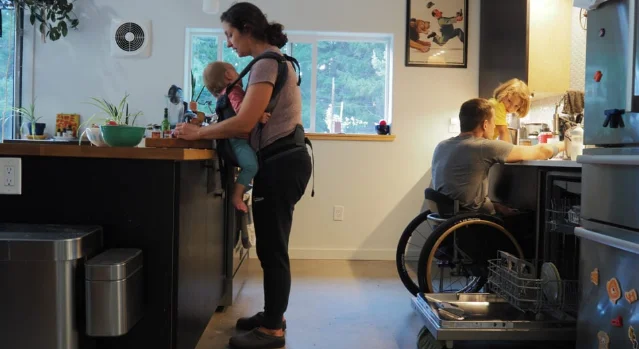Selecting the right contractor for accessible home modifications is a crucial decision that can significantly impact the safety, comfort, and quality of life for those with mobility challenges.
Whether you are making modifications to accommodate aging in place, disabilities, or other special needs, the expertise and reliability of the contractor are paramount.
Enhancing Home Accessibility
Accessible home modifications are changes made to a home to improve its usability for individuals with physical limitations. These modifications can range from simple adjustments, like installing grab bars in the bathroom, to more extensive renovations, such as widening doorways or installing ramps.
The goal of these modifications is to enhance the safety, independence, and quality of life for people with disabilities or those who wish to age in place comfortably.
Common types of accessible home modifications include:
- Installing grab bars and handrails
- Building ramps or installing stairlifts
- Widening doorways and hallways
- Lowering countertops and cabinets
- Adding non-slip flooring
- Modifying bathrooms with roll-in showers and raised toilets
The Importance of Hiring the Right Contractor
Choosing the right contractor for accessible home modifications is crucial. A specialized contractor brings specific skills and knowledge essential for making homes safer and more accessible. Here’s why hiring a professional experienced in accessible renovations is vital:
Expertise in Accessibility Standards
Specialized contractors are well-versed in accessibility standards and guidelines, ensuring that modifications comply with legal requirements and best practices.
Customized Solutions
An experienced contractor can tailor modifications to meet the unique needs of the individual, ensuring that the changes enhance usability and comfort.
Quality and Safety
Properly executed modifications reduce the risk of accidents and injuries. A skilled contractor will use high-quality materials and adhere to safety standards, providing peace of mind for homeowners.
Cost-Effective
While it might seem costlier initially, hiring a qualified contractor can save money in the long run by preventing costly mistakes and ensuring the modifications are done right the first time.
Enhanced Health Outcomes
Effective modifications can significantly improve health outcomes by reducing the risk of falls and other injuries, promoting independence, and enhancing overall well-being.
Key Factors to Consider When Choosing a Contractor
Selecting the right contractor involves careful consideration of several factors. Here are the key criteria to evaluate:
Certifications and Qualifications
Ensure that the contractor holds relevant certifications and qualifications. Look for credentials such as Certified Aging-in-Place Specialist (CAPS) or other certifications related to accessible design and construction. These certifications indicate that the contractor has received training specific to the needs of individuals requiring accessibility modifications.
Experience with Accessible Home Modifications
Experience is critical. Inquire about the contractor’s previous projects related to accessible home modifications. An experienced contractor will have a portfolio of past work demonstrating their ability to execute modifications that meet the needs of individuals with disabilities.
Reviews and Testimonials
Research reviews and testimonials from past clients. Positive feedback from previous clients can provide insights into the contractor’s reliability, quality of work, and professionalism. Look for reviews that specifically mention the contractor’s experience with accessible modifications.
Licensing and Insurance
Verify that the contractor is properly licensed and insured. Licensing ensures that the contractor meets state and local requirements for practicing in your area. Insurance protects you from liability in case of accidents or damages during the project.
Portfolio of Past Projects
Review the contractor’s portfolio to see examples of their previous work. A diverse portfolio showcasing various types of accessible modifications indicates the contractor’s versatility and capability to handle different project requirements.
Knowledge of Local Building Codes and Regulations
Ensure that the contractor is knowledgeable about local building codes and regulations related to accessibility. Compliance with these regulations is essential to ensure that the modifications are legally and safely executed.
Questions to Ask Potential Contractors
When interviewing potential contractors, ask the following questions to assess their suitability for your project:
Can You Provide References from Past Clients?
Request references from past clients who have had similar modifications done. Speaking directly with previous clients can provide valuable insights into the contractor’s performance and reliability.
What Is Your Experience with Accessible Home Modifications?
Inquire about the contractor’s specific experience with accessible modifications. Ask for details about the types of projects they have completed and the outcomes of those projects.
Are You Licensed and Insured?
Confirm that the contractor holds the necessary licenses and insurance coverage. This protects you from potential legal and financial issues that may arise during the project.
How Do You Handle Project Timelines and Budgets?
Discuss how the contractor manages project timelines and budgets. A reliable contractor should provide a clear plan and timeline for the project and be transparent about costs.
What Kind of Warranty or Guarantee Do You Offer on Your Work?
Ask about warranties or guarantees on the work performed. A contractor who stands behind their work will offer a warranty, providing peace of mind in case any issues arise after the project is completed.
Red Flags to Watch Out For
Be aware of common warning signs that may indicate an untrustworthy contractor:
Lack of References or Poor Reviews
If a contractor cannot provide references or has consistently poor reviews, consider it a red flag. Reliable contractors should have a track record of satisfied clients willing to vouch for their work.
Unclear or Vague Contracts
Contracts should be clear and detailed, outlining the scope of work, timelines, and costs. Avoid contractors who provide vague or incomplete contracts, as this can lead to misunderstandings and disputes.
High Upfront Costs or Suspiciously Low Bids
Be cautious of contractors who demand high upfront payments or offer bids significantly lower than others. This could indicate financial instability or potential cutting of corners on the project.
Pressure to Make Quick Decisions
A reputable contractor will give you the time to make informed decisions. Beware of those who pressure you to sign contracts or make quick decisions, as this could be a tactic to rush you into an unfavorable agreement.
The Role of Communication and Collaboration
Clear communication and collaboration between you and your contractor are vital for the success of the project. Here are some tips for maintaining effective communication:
Setting Clear Expectations and Goals
From the outset, establish clear expectations and goals for the project. Discuss your specific needs and preferences, and ensure that the contractor understands and agrees with them.
Regular Updates and Progress Reports
Ask the contractor to provide regular updates and progress reports throughout the project. This keeps you informed about the work’s status and allows you to address any issues promptly.
Addressing Concerns Promptly
Encourage open communication and address any concerns or questions as soon as they arise. Promptly resolving issues helps keep the project on track and prevents misunderstandings.
Finalizing the Contract and Starting the Project
Once you have chosen a contractor, follow these steps to finalize the agreement and begin the project smoothly:
Reviewing and Understanding the Contract
Carefully review the contract to ensure that all terms and conditions are clearly stated and understood. Pay attention to the scope of work, timelines, payment schedules, and any warranties or guarantees.
Setting a Realistic Timeline and Budget
Work with the contractor to establish a realistic timeline and budget for the project. Consider potential delays or additional costs that may arise and plan accordingly.
Preparing the Home for Modifications
Prepare your home for the modifications by clearing the work areas and making any necessary arrangements for temporary accommodations if required. Ensure that the contractor has easy access to the work site.
Maintaining Open Communication Throughout the Project
Maintain open lines of communication with the contractor throughout the project. Regularly check in on the progress and address any concerns or questions promptly to ensure the project stays on track.
Conclusion
Selecting the right contractor for accessible home modifications is essential to ensure that the work is completed safely, efficiently, and to a high standard. Considering factors such as certifications, experience, and reviews, can evaluate a contractor’s qualifications and reliability.
Take the time to research and choose a contractor who understands your needs and is committed to creating a safe and accessible environment for you or your loved ones.

Ruby Stauffer is a prominent technology blogger known for her insightful analysis and in-depth reviews of the latest tech trends and gadgets. Her blog has become a go-to resource for tech enthusiasts seeking reliable information and expert opinions on the ever-evolving world of technology.

